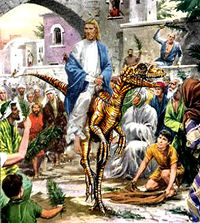Portal:Religion
Religion generally involves the following or worship of a creed or deity in which one has optimistically attributed supernatural powers. "True Believers" are often labeled as schizophrenics or having some other neurological disorders in certain scientific-minded and rational circles, although the loudest among them tend to be derided for their poor fashion sense and general smelliness. According to a secular understanding of history, religion was invented by tribal chieftans at least two million years ago in order to control and exploit their fellow tribal members, and it was going strong in the Western World until that separation of Church and State nonsense. In the third world, it's business as usual. God is often portrayed as a giant bearded man in the sky that flies around granting wishes, although some religions would prefer you not portray him at all.
This girl at my school is a Fundagelical Christian or something like that. She always wears these shirts that say "God will save you" which I know is bullshit, because that God dude didn't do shit to save me from getting caught by the cops for putting that Hamster in the microwave at the gas station down the street. Hey, the sign said "Free for use", it's not my fault they didn't specify the use. And anyway, I don't see the need for handcuffs. It's not like it was my hamster in the first place. Fundagelical Christians are also often seen with bumper stickers saying such messages as "Jesus loves you" and have that stupid little fish logo. They are responsible for any corny sayings with the word "Jesus" or "God" in them But I'm wandering from my main point, which is that Fundagelical Christianity is very confusing. (See more...)
Jerry Lamon Falwell, Sr. (August 11, 1933 – May 15, 2007) was an American fundamentalist Christian pastor and televangelist. He was the founding pastor of the Thomas Road Baptist Church in Lynchburg, Virginia in the Christian (big "C") nation of the United States of America. He founded Liberty University in 1971 and co-founded the Moral Majority in 1979.
Falwell led services at Thomas Road Baptist Church, a megachurch in Lynchburg, Virginia from 1956-2007. His Christ-centered leadership lead to the expansion of the church, with it eventually reaching gigachurch status... (See more...)
EARTH, Sol System – The Rapture, long awaited by people who don't want to hang around to see how it all turns out, finally occurred this morning, catching even the most militant biblical literalists by surprise. At approximately two o'clock (GMT), various body parts of pious citizens across the globe simply disappeared.
"Yeah, my bad." apologized the archangel Michael at the post-Rapture press conference. "It's a numbers thing, you see. We'd initially planned for 144,000 male Jewish virgins 'plus guest', making for a maximum total of less than 300,000 people, body and soul." Industry, transportation and communications worldwide were interrupted after bits of people were raised bodily up to Heaven to be with our LORD. Period keys on keyboards, for example, remained unpushed for the better share of a day after the third fingers of typists departed the right hands to which they had previously been permanently attached, leading to many run-on sentences with no end in sight... (See more...)
- A slice of toast seen on the face of Jesus (Pictured)
- Devoutly gay man feels conflicted after admitting attraction to Christianity
- Pope John Paul II posthumously wins Monsignor Universe beauty contest
- Global faith crisis after miraculous resurrection of Madalyn Murray O'Hair, America's "most hated woman"
- Outrage over practice of throwing virgins into volcanos in India
- Meditated Buddhist monks accused of sleeping on the job
- The Heavens rejoice as Dow Jones market index surpasses 14,000
- Shock as God admits: "I experimented with evolution"
| “ | To think I kissed her (or him) there—and there—and there! | ” |
— Sarah Michelle Gellar on Baphomet
| ||
- ... that the Heaven's Gate cult was actually a covert group of Star Wars superfans who wanted to make Star Trek look bad?
- ... that ancient Shinto temples aren't portals to anime world, please don't kill yourself there?
- ... that the theory of Intelligent Design can be easily debunked by looking at a platypus?
- ... that with a sufficient BAC, the blood of Christ could literally turn into wine?
- ... that as part of their faith, Jehova's Witness members are sent to a community college to harass passers-by?
-
Art
Peak pretentiousness -
Business
Money, money, money! -
Comedy
The science of funny -
Culinary
Food for the soul -
Film
Enter the Matrix -
Games
Recess time -
Gay
A gay ol' time -
Geography
Get lost -
History
Factually wrong -
Literature
Literally illiterate -
Internet
A series of tubes -
Music
Rock on! -
Politics
Politically incorrect -
People
The people's portal -
Religion
Speak of the Devil -
Science
Playing to be God -
Society
We live in one -
Technology
Breaking stuff easier -
Television
Turn your brain off -
Theatre
To be or not to be -
Video Games
Better than sex -
Zoology
Beware of furries -
Portals
Meta-Portal -
Community
The Community -
Main Page
The Uncyclopedia









